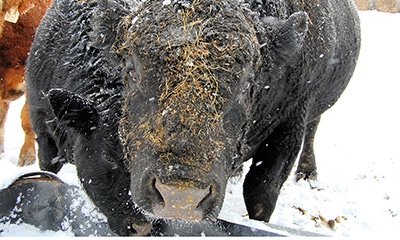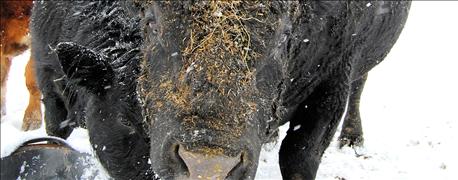
Days before Winter Storm Jonas’ first flake fell, East Coast state ag officials reminded farmers and warned those less experienced about blizzard and cold weather critter care. While you may be finished with shoveling out after Jonas, consider this as a quick refresher course for the next round of extreme winter.
Just because livestock and pets have fur, they’re not immune to hypothermia caused by low temperatures and high winds. Remember, your income is directly tied to their health. They can suffer frostbite, just like you can.

KEEP ME WARM: Even hairy beasts like this need shelter and high-energy feed to ward off bad winter weather.
“It’s easy to think that dogs are immune to cold because of their fur. But more dogs perish in the winter than at any other time of the year,” reports Joel Hersh, executive director of the Pennsylvania State Animal Response Team. Yes, some are better able to handle the cold than others, but take simple precautions for all, such as providing protection from the wind, clean and dry bedding and water.
Remember, you’ve got a lot of money invested on-the-hoof of farm livestock. To weather cold weather, they require extra energy via hay and or grain – unfrozen hay or grain.
Plan milk and feed hauling ahead
Dairy farmers should already have winter storm emergency protocols already in place with milk cooperatives and haulers. They need to know your storage tank capacity in advance.
Make sure your township supervisors are alert to your farm’s pickup and delivery needs.
Create a bank of important phone numbers for individuals and suppliers you work with, including contact information for your local emergency management agency.
If you must dump milk due to road closures, Pennsylvania Department of Environmental Protection urges the following:
* Take all necessary steps to prevent milk from entering any waterway.
* Dump milk into a manure pond or natural depression.
* Only dump the amount of milk necessary to accommodate the needed milking, due to runoff when snow melts.
Maryland’s Department of Agriculture rightly targeted smaller farms, back-yard livestock and poultry folks and companion animal-ers with advice from State Veterinarian Dr. Michael Radebaugh. Those precautions include ensuring access to clean, unfrozen water, increasing feed to provide energy which helps animals stay warm and providing shelter so animals can escape wind and heavy snow.
Even guardian dogs and barn cats that live outside still need dry, clean, enclosed spaces such as dog or cat houses that help retain body heat. Also, keep them away from antifreeze, which tastes sweet to animals, but is extremely toxic.
While you’re at it, make sure your feet are well-grounded – not surfing on ice. You can’t risk concussions, broken bones or worse. Keep at least one pair of ice cleats – spiked versions – in your pickup, tractor cab or entry way – along with a log chain, shovel, cell phone and a stash of high-energy snacks.
About the Author(s)
You May Also Like




